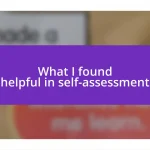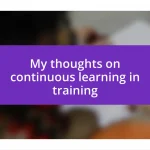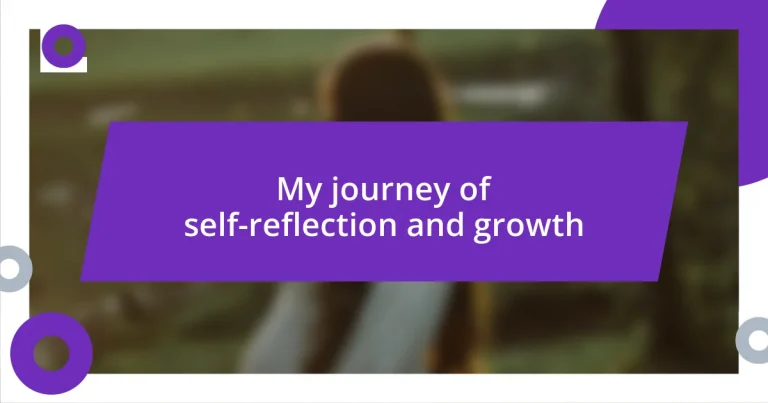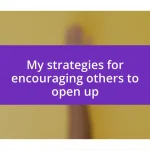Key takeaways:
- Self-reflection enhances clarity, emotional intelligence, and personal growth by allowing individuals to understand their feelings and improve communication skills.
- Implementing techniques like reflective journaling, meditation, and seeking feedback can deepen self-awareness and facilitate personal development.
- Tracking progress and celebrating milestones, no matter how small, fosters motivation and reinforces the importance of recognizing one’s growth journey.
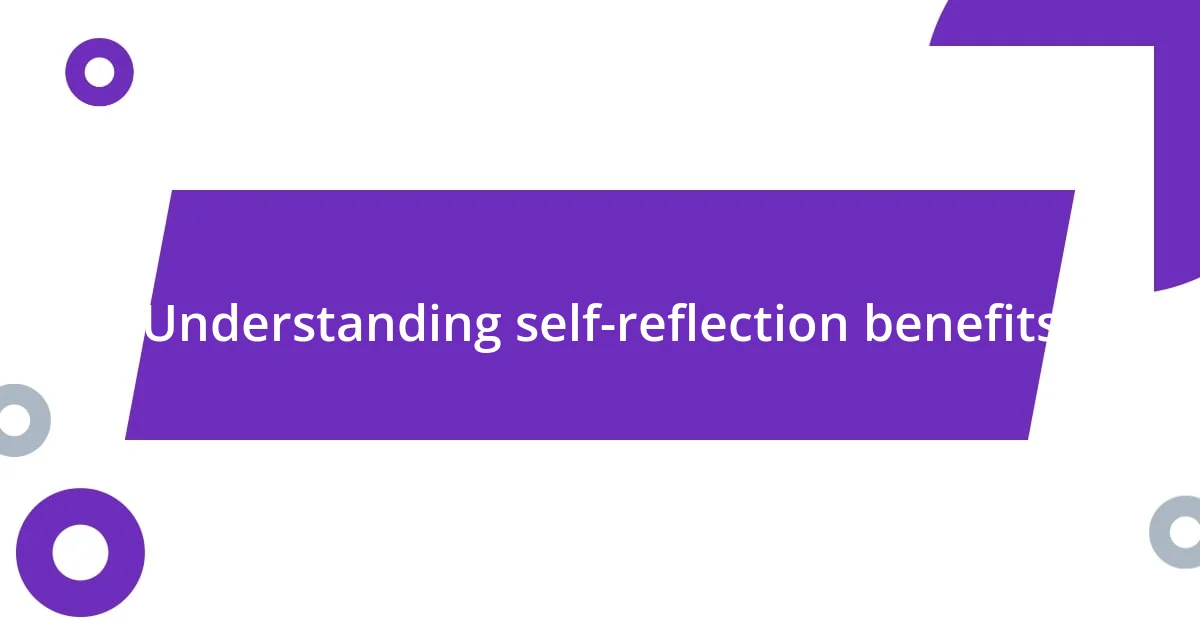
Understanding self-reflection benefits
One of the significant benefits of self-reflection is the clarity it provides. I vividly recall a time when I faced a career crossroads. By taking long walks and reflecting on what truly mattered to me, I unearthed my passion for helping others, something I had overlooked in the hustle of daily life. Have you ever felt stuck but found that some quiet time led you to breakthrough ideas?
Self-reflection also fosters personal growth by revealing areas for improvement. I remember a particularly difficult feedback session at work that hit me hard. Instead of becoming defensive, I took a step back and used that experience to analyze my communication style. This led to tangible changes in how I interacted with my team, enhancing both my confidence and effectiveness. Have you taken the time to consider how feedback can be a stepping stone rather than a setback?
Moreover, self-reflection nurtures emotional intelligence, allowing us to better understand ourselves and others. There was a moment when I had a disagreement with a close friend, and instead of reacting impulsively, I paused to understand my feelings and the reasons behind their actions. This simple act of reflection transformed a potential rift into a deep, enriching conversation. Isn’t it fascinating how looking inward can improve our relationships with those around us?
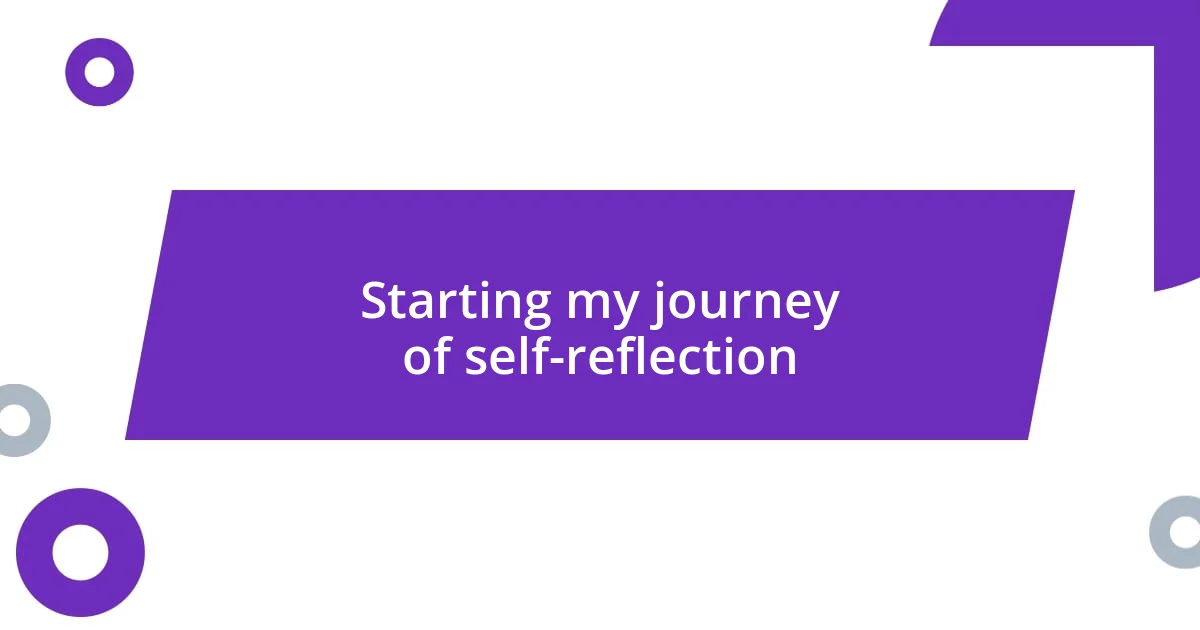
Starting my journey of self-reflection
Starting my journey of self-reflection wasn’t as straightforward as I had hoped. Initially, I felt overwhelmed by the accountability it required. I remember sitting at my kitchen table with a blank journal, staring at the empty pages. It was daunting, but I knew that digging deeper into my thoughts was essential for growth. Embracing the discomfort wasn’t easy, but I found that honesty with myself opened doors to insights I had been avoiding.
- I began with simple prompts, like “What makes me happy?” and “What are my biggest fears?”
- Each question peeled back layers I hadn’t acknowledged before.
- I felt a mix of apprehension and excitement as I confronted my thoughts.
- I learned that each reflection brought clarity, revealing not just what I wanted but also what I truly needed to let go of.
As I ventured into this process, I discovered that writing about my emotions often turned my anxieties into manageable thoughts. For instance, I recall one night when I poured my feelings onto paper, detailing my struggles with self-doubt. It felt liberating, almost therapeutic. By the end of that session, I turned a flickering flame of worry into an actionable plan to build my self-esteem. This shift was crucial in motivating me to keep exploring my inner self.
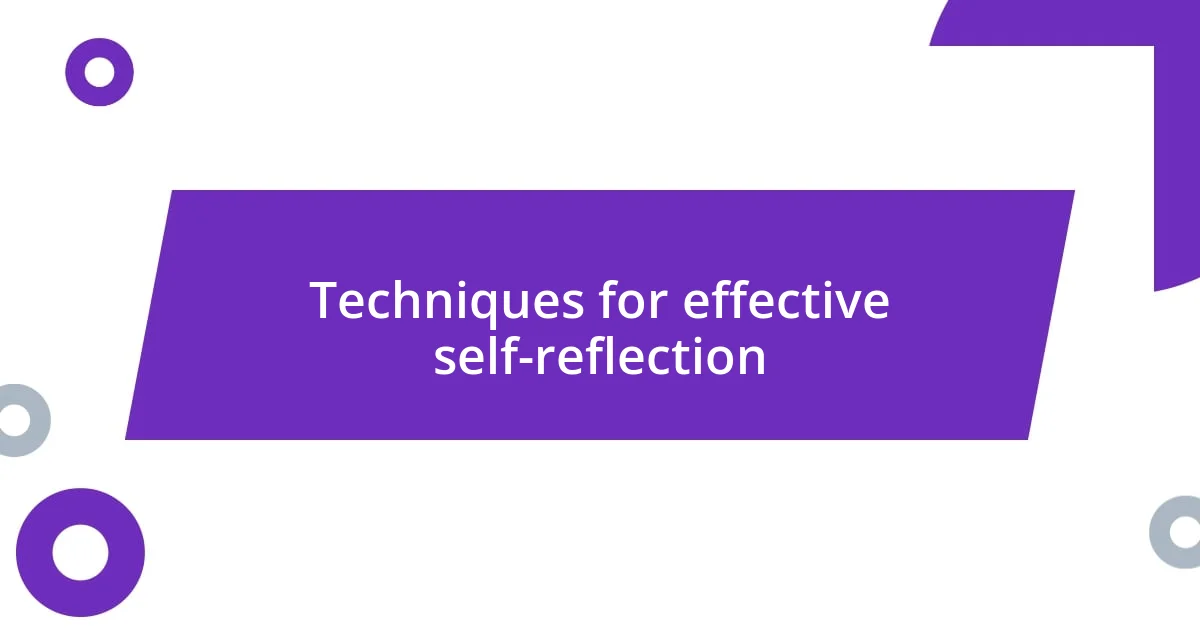
Techniques for effective self-reflection
Reflective journaling has been a powerful technique for me. It’s not just writing; it’s a dialogue between my past and present selves. I often dedicate a few minutes each day to jot down my thoughts and experiences. This simple act allows me to revisit challenges and emotions. I remember a day when I felt particularly lost; writing helped me sift through the chaos in my mind and discover the underlying themes of my struggles. Have you ever tried putting pen to paper to unravel your thoughts?
Meditation is another invaluable practice I’ve embraced. By sitting in silence, I create space to observe my thoughts without judgment. I vividly recall the first time I meditated; it was unsettling to sit alone with my thoughts. However, I soon learned to embrace those moments of stillness. The clarity that emerged was profound, often revealing insights about my true desires and fears. Isn’t it remarkable how stepping back can sometimes propel us forward?
Seeking feedback from trusted friends or mentors can also deepen self-reflection. Their perspectives provide an invaluable mirror for my behavior and choices. I distinctly remember asking a friend to help me understand how I come across in professional settings. Their candid feedback illuminated blind spots I hadn’t considered. This process of external reflection paired with internal contemplation has given me a more rounded view of myself. Have you harnessed the power of genuine feedback to fuel your growth?
| Technique | Description |
|---|---|
| Reflective Journaling | A personal practice of writing down thoughts and experiences to gain insights. |
| Meditation | A technique to observe thoughts and feelings without judgment, promoting clarity. |
| Seeking Feedback | Inviting perspectives from others to understand blind spots and enhance self-awareness. |
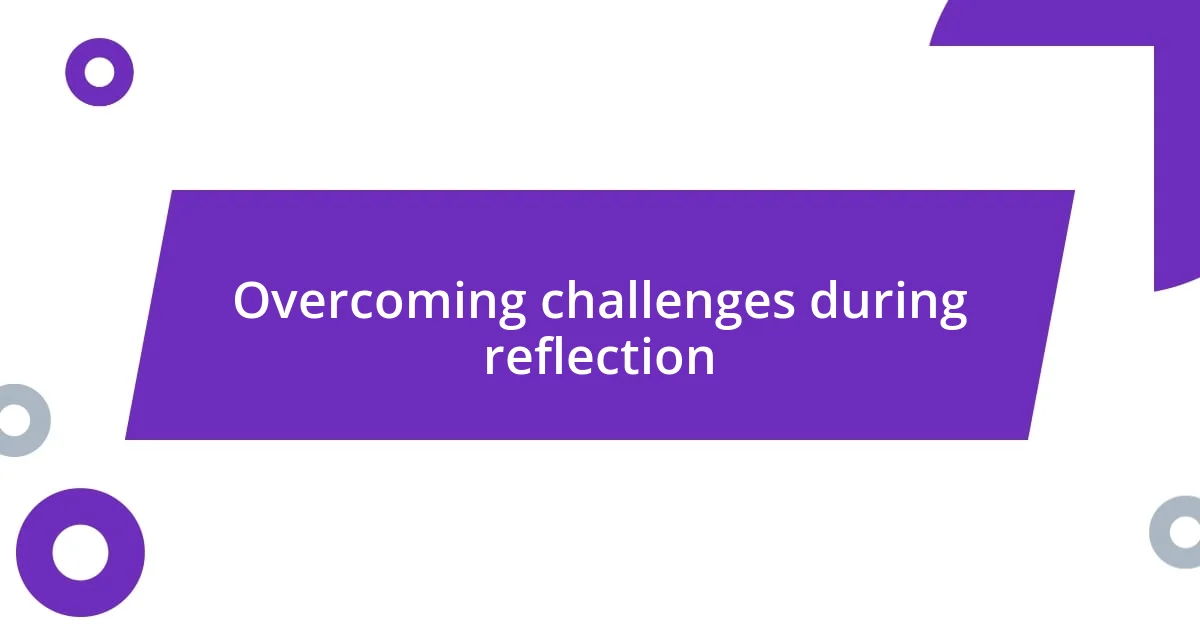
Overcoming challenges during reflection
As I dove deeper into self-reflection, I faced some unexpected obstacles. One evening, I tried to confront a particularly painful memory, and the emotional tidal wave nearly knocked me down. Have you ever had a moment where the weight of your past felt too heavy to bear? I realized that it’s normal to struggle with difficult emotions, and sometimes, pausing to breathe and acknowledging that pain is a crucial step in overcoming it.
Another challenge was maintaining motivation. There were days when the thought of self-reflection felt more like a chore than an opportunity for growth. I remember setting aside time to reflect but finding myself scrolling through my phone instead. What’s the point of reflecting if I can’t even sit with my thoughts? In those moments, I learned to set smaller, achievable goals, like jotting down just one thought or feeling. These mini-reflections helped me regain momentum without feeling overwhelmed.
As I reflected more, I began to encounter resistance from my own inner critic. Sometimes, I’d belittle my thoughts as unworthy or trivial. This self-doubt can be incredibly stifling, can’t it? Gaining clarity on my feelings took patience and compassion towards myself. I adopted the mantra, “Every thought matters,” which helped quiet that inner voice. By nurturing a kinder dialogue, I found that I could explore my emotions without the fear of judgment, turning what felt like an insurmountable challenge into a manageable journey.
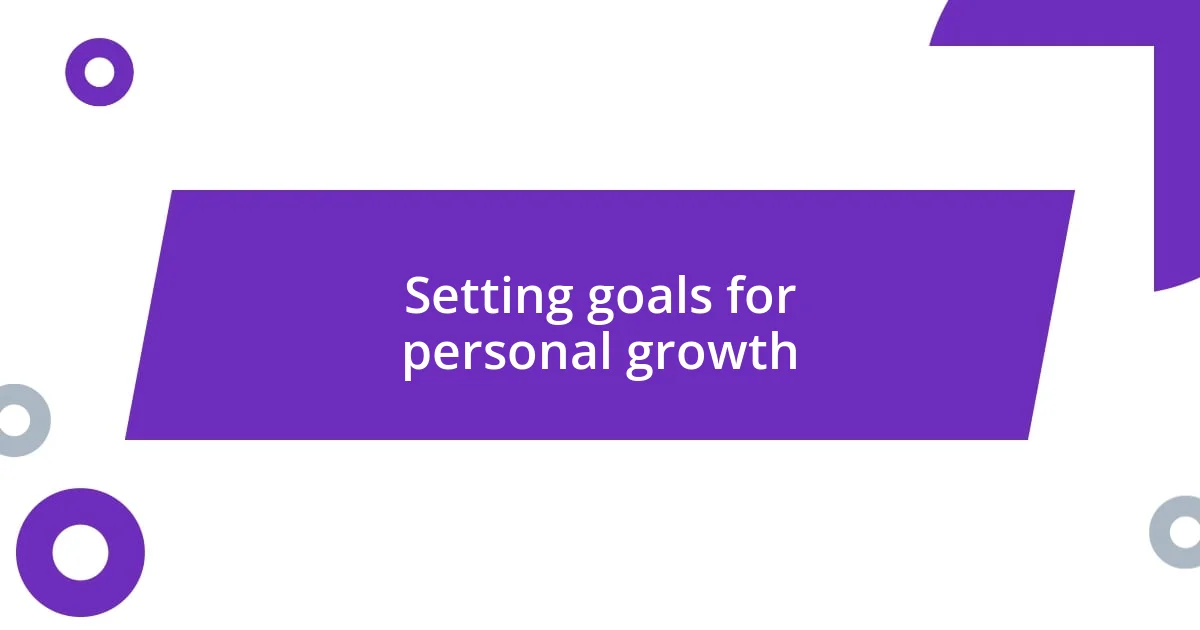
Setting goals for personal growth
Setting goals for personal growth has been an enlightening experience for me. Initially, I thought simply having aspirations was enough. However, I’ve learned that specific, measurable goals truly propel growth. For example, I once aimed to improve my public speaking skills. I didn’t just say, “I want to speak better”; I set a goal to join a local Toastmasters club. The process transformed my fear into confidence.
As I crafted my goals, I found it helpful to break them down into smaller, bite-sized actions. One of my targets was to read more about personal development. Instead of feeling overwhelmed by the vast number of books, I committed to reading just a chapter a week. This incremental approach made the task manageable, and I was amazed at how quickly I saw changes in my mindset and perspectives. Have you ever noticed how small steps can ignite bigger transformations?
Reflecting on my progress became a vital part of this journey. I remember maintaining a simple spreadsheet to track my goals and reflect on my feelings related to each milestone. This practice not only kept me accountable but also revealed patterns in my growth. It was incredible to see how my confidence grew with each small success. How do you keep track of your personal growth? Finding a method that resonates with you can make all the difference in your journey.
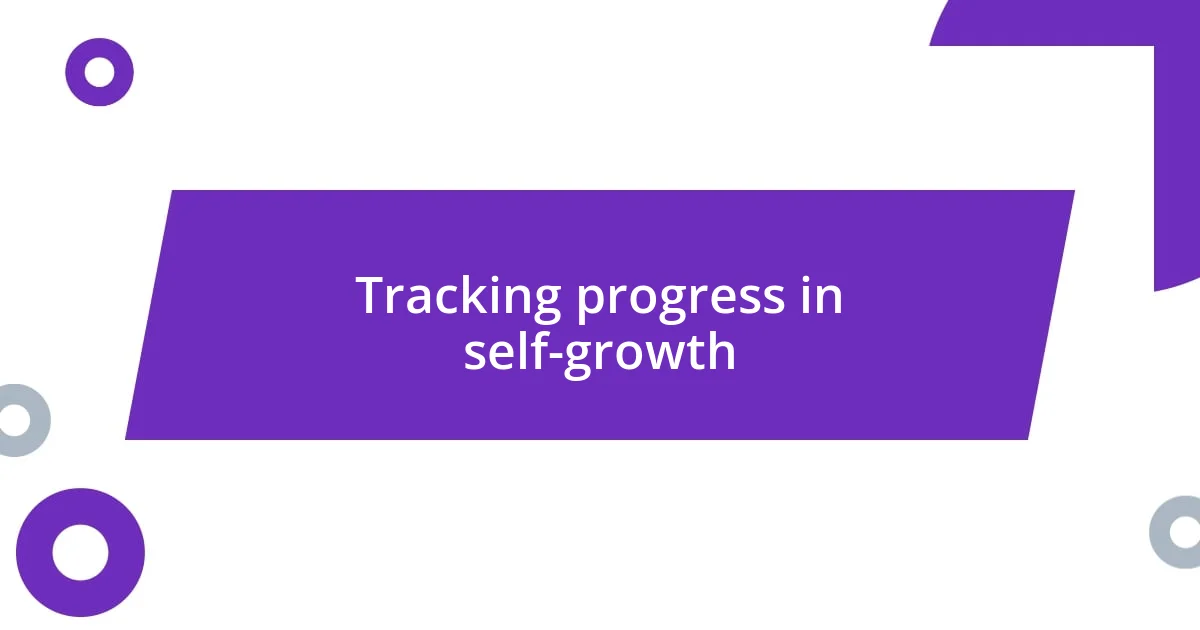
Tracking progress in self-growth
Tracking my progress in self-growth has been a transformative experience in itself. I started out jotting down my thoughts in a journal, but I realized I needed something more structured. I created a visual progress chart where I would mark achievements and setbacks. Seeing the small dots align over time gave me a tangible sense of progression. Have you ever felt that rush when you see your efforts materialize on paper?
One particularly rewarding aspect was revisiting my entries after a few months. I remember flipping back to my early reflections and feeling a mix of surprise and pride. I had written about fears that once felt insurmountable. Yet, as I read through those words, I could see how far I’d come, not just in tackling those fears but in understanding myself better. This retrospective view reinforced the importance of patience in the growth process—do you ever find it difficult to acknowledge how much you’ve changed?
I also found that celebrating my milestones, regardless of size, played a critical role in maintaining my motivation. One day, I treated myself to a cozy afternoon with my favorite book after achieving a personal goal. It was a small victory, but celebrating it made me more excited for the next challenge. Tracking progress isn’t just about noting what I’ve done; it’s about acknowledging the journey itself. When was the last time you celebrated your progress, no matter how small?
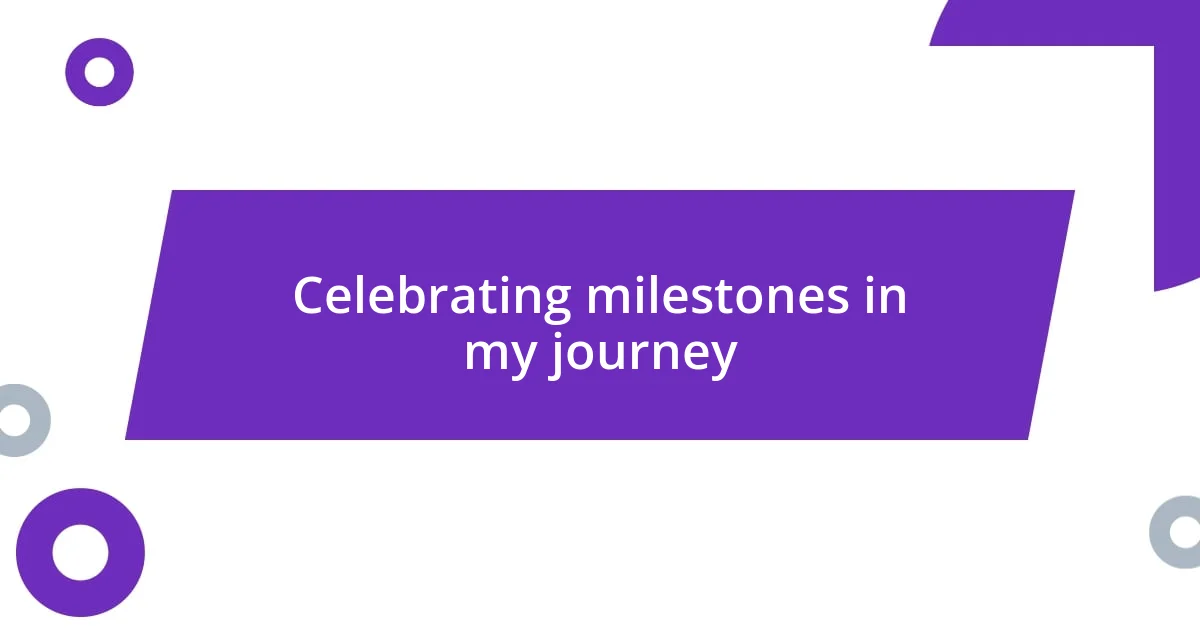
Celebrating milestones in my journey
Celebrating milestones in my journey has become a cherished practice. I vividly recall the thrill I felt when I completed my first goal—attending a workshop that pushed me beyond my comfort zone. That day, I treated myself to a small dinner at my favorite café, reflecting on what I’d learned while savoring every bite. It made me realize that acknowledging even the tiniest achievements can foster a sense of accomplishment. When was the last time you recognized a personal victory, no matter how small?
As I continued to reach new goals, I made it a point to share these moments with my friends and family. I remember gathering my closest friends for a small celebration after I delivered my first public speech. Their applause felt like a warm embrace, reinforcing my belief that celebrating with others amplifies joy. Have you ever noticed that sharing your triumphs can make them feel even more significant? Those moments of connection transformed lonely victories into communal ones.
I’ve also embraced the practice of creating “milestone rituals” for myself. After achieving a major personal goal, like finishing my first marathon, I took a day to unwind with a spa treatment. The experience wasn’t just about self-pampering; it served as a powerful reminder that hard work deserves recognition. Rituals like this deepen the emotional connection to my journey. How do you personally celebrate your milestones? Finding a way that resonates with you can enhance your growth journey even further.





